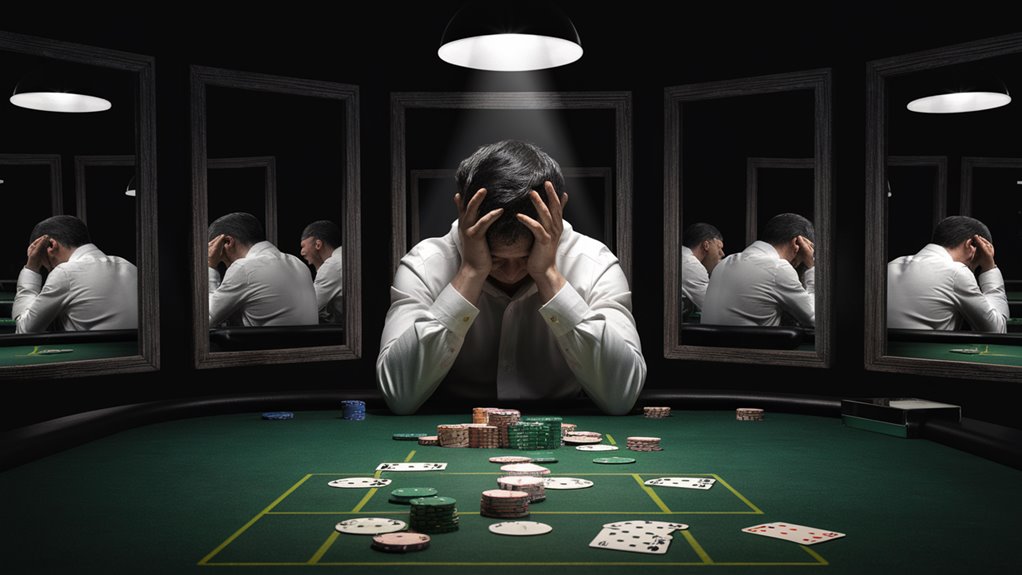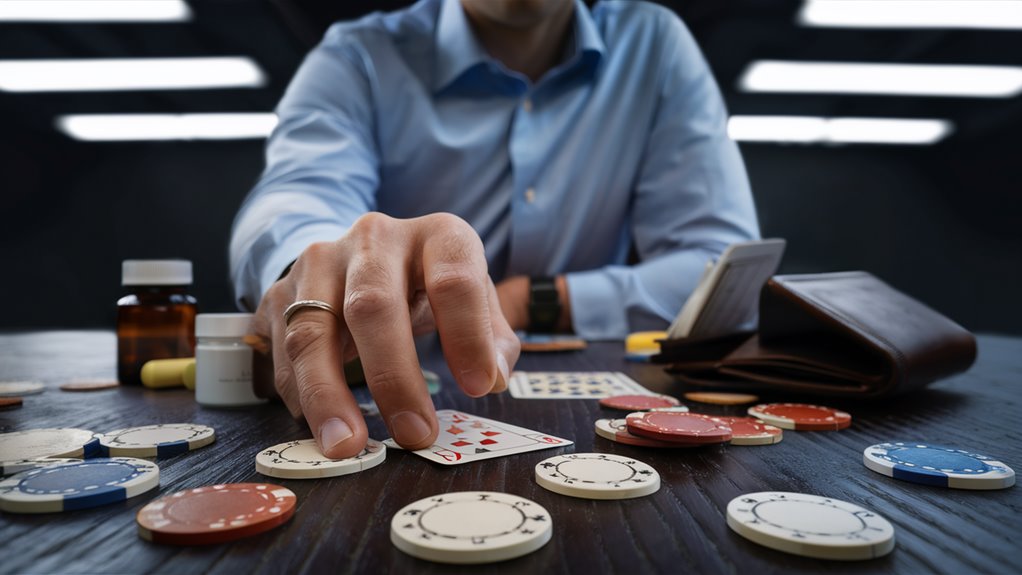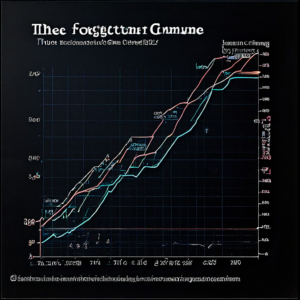
How Gambling Changes the Brain

The Brain and Betting
When we place bets, the brain lights up, and huge bursts of dopamine follow, reaching up to 10 times the norm. It’s similar to drug use effects. AI Enhances Player intense dopamine surge alters how the brain perceives pleasure, mostly in the nucleus accumbens and prefrontal cortex.
Brain Path Changes and Thinking
Frequent betting bolsters certain brain pathways while it weakens our ability to perform challenging tasks. This shift increases the likelihood of addiction and higher odds of deep sadness. Brain parts that aid in decision making deplete over time, leading to poor choices and excessive gambling.
Dangers of Online Gambling
New online gambling platforms introduce added risks with their always open model and clever tactics to keep us playing. These tactics deceive the brain’s reward system, simplifying the slide into harmful gambling habits.
Understanding Neuroscience to Help
The brain changes from gambling display intricate patterns, yet understanding this brain science aids in discovering effective methods to repair and halt harmful gambling. By concentrating on the specific brain areas modified by gambling, doctors can devise better recovery and maintenance strategies.
The Science Behind Gambling Tendencies
The Brain’s Love for Betting
Beginning to gamble triggers the brain’s reward center via dopamine in the nucleus accumbens. This massive dopamine release provides a high, encouraging anticipation for more, similar to drug euphoria or pleasures from food and love.
Brain Changes and Increased Cravings
Frequent gambling profoundly alters the brain’s pathways, dampening excitement from wins. This crucial alteration drives gamblers to bet more often to regain the high feeling. The prefrontal cortex, responsible for impulse control and decision-making, is impaired during gambling.
Near Misses and Stress
Near wins activate brain regions almost as if they were actual wins, stimulating the ventral striatum and insula. This encourages continued gambling despite consistent losses.
The brain’s stress mechanisms overact during gambling, resulting in excessive cortisol and norepinephrine production, impairing decision-making and risk assessment.
Crucial Brain Regions in Gambling
- Nucleus Accumbens: Main pleasure center
- Dopamine System: Manages joy and motivation
- Prefrontal Cortex: Controls decisions and impulse
- Ventral Striatum: Influences rewards and motivation
- Stress Mechanisms: Regulates emotions and the body
Identifying Gambling Issues
Behavioral Indicators of Heavy Gambling
Extensive gambling is evident through obvious behavioral signs signaling a growing addiction.
- Increasing bet sums to sustain excitement
- Attempting but failing to quit gambling
- Constantly thinking about gambling
Mental and Emotional Signals
Developing a gambling addiction typically starts with distinct mental signs.
- Intense restlessness when reducing bets
- Increase in irritability when attempting to stop
- Persistent thoughts about gambling
Financial Issues Due to Gambling
Poor gambling habits commonly manifest through clear financial implications:
- Chasing losses to recuperate money
- Concealing gambling activities
- Seeking financial aid from friends or relatives
- Jeopardizing important relationships or employment
Stress and Gambling
Poor gambling habits often surface when feeling down:
- Using gambling to avoid facing problems
- Gambling more under stress
- Relying on gambling for emotional relief
- Feeling low when not gambling
Recognizing these indicators enables early intervention and the establishment of effective recovery strategies for those struggling with excessive gambling.
The Intense Connection Between Sadness and Gambling Issues
Understanding the Brain Connection
Sadness and gambling issues are closely linked within the brain, creating a detrimental cycle in the brain’s pleasure system.
Feeling sad, the brain reduces essential neurotransmitters like serotonin and dopamine, pushing us toward temporary pleasure from gambling.
Impact of Gambling on the Brain
Gambling disrupts brain chemistry, leading to significant mental health concerns. While gambling, the brain releases dopamine, temporarily enhancing mood. This artificial boost establishes a dangerous dependency cycle as brain pathways begin associating gambling with emotional uplift.
Sorrow and Gambling: By the Figures
Medical research indicates that individuals with gambling problems have a significantly higher prevalence of severe depression.
- Our sleep patterns
- Our stress management
- Our processing of pleasure
- Our overall mood
These brain alterations intensify feelings of sadness, initiating a cycle that requires medical intervention for effective treatment and recovery.
The Role of Dopamine in Gambling

The Neuroscience of Gambling Pleasure
Dopamine levels soar up to 10 times higher during gambling, affecting the brain’s pleasure pathways. Research shows this substantial neurotransmitter increase mirrors addiction to substances.
Brain Pathways and Increased Gambling
The brain preps for more through uncertain win timings. Each win triggers a significant dopamine rush, reinforcing the brain pathways favorable to gambling.
Addiction Pathways and Brain Function
The brain manages wins and pleasurable experiences 토토사이트 similarly, using the same pathways. This reveals why gambling addiction resembles drug dependency closely.
Key Brain Components:
- Dopamine release during anticipation
- Reward pathways activation
- Near misses encouraging continued play
- Brain pathways strengthening
- Adaptation to the dopamine high
Online Gambling and Its Perils: A New Issue
Adapting to Online Gambling
Online gambling venues introduce new addiction dangers with non-stop availability and clever hooks. These platforms utilize sophisticated tracking and personalized tactics that strongly influence our brain’s reward centers, making them more addictive than traditional gambling methods.
Brain Impact of Online Gambling
Reward Centers Activate
Mobile betting apps and online casinos sustain dopamine flow through intelligent designs like:
- Notifications that lure us back
- Social strategies to retain us
- Immediate payment methods
- Random win timings
Risks Escalate with Technology
Online gambling platforms deploy strategic measures that:
- Monitor our behaviors
- Detect our likely playing times
- Target us during lows
- Capitalize on our fatigue
This creates an environment where gambling issues can rapidly escalate in our digital era.
Proven Methods to Address Gambling Problems
Primary Treatment Approaches
Contemporary solutions to gambling issues employ multiple proven methods targeting both brain regions and mental aspects of the addiction.
Cognitive-Behavioral Therapy (CBT)
Cognitive-Behavioral Therapy ranks among the top strategies to tackle gambling issues, modifying the brain’s reward centers.
Pharmacological Interventions
Pharmacological treatments include substances like naltrexone, which regulates the dopamine systems that drive compulsive gambling.
Comprehensive Support Methods
Group and Family Therapy
Support groups and family therapy play crucial roles in supplementary treatments by activating social reward pathways that combat gambling urges.
Financial Guidance and Recovery Plans
Financial guidance offers necessary tangible support, tackling monetary issues while mitigating stress-induced gambling impulses.
Proven Prevention and Support Plans for Gambling Issues
Brain-Based Prevention Strategies
Preventing gambling issues requires a holistic approach focusing on vulnerable brain areas before addiction takes hold.
Early Intervention Programs
Early detection and intervention are crucial in identifying potential gambling problems.
Risk Assessment and Lifestyle Adjustments
Employing validated assessment tools allows accurate evaluation of immediate risk factors and reward-seeking behavior patterns.
Key Prevention Components
- Cognitive-behavioral therapy integration
- Reward pathway modifications
- Peer support enhancements
- Brain plasticity improvements
- Stress management techniques





